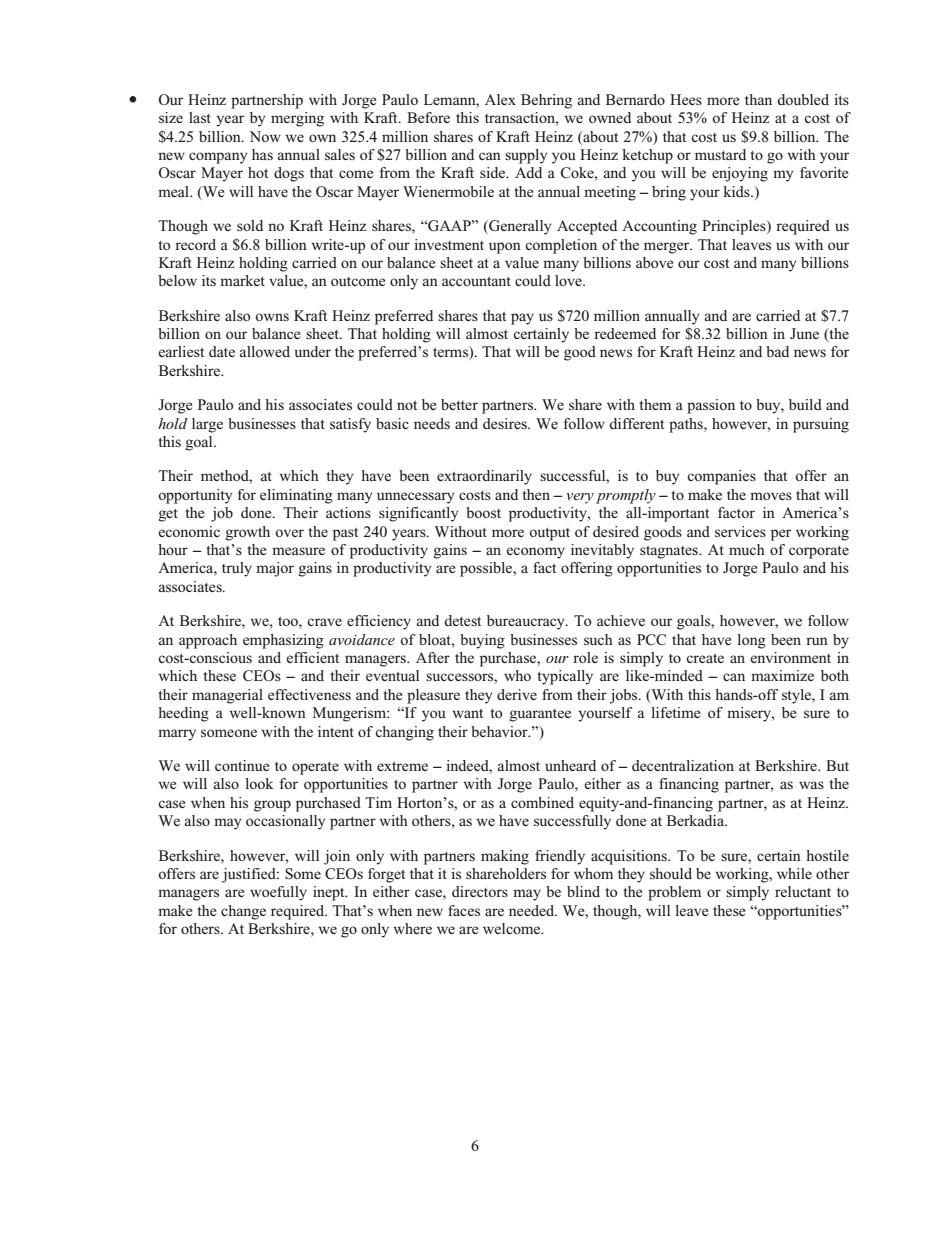正在加载图片...

$4.25 billion.Now we own 325.4 million shares of Kraft Heinz (about 27%)that cost us 59.8 billion.The O心oaomom thera时apn eting-bring you Though we sc Accounting Principles)required us Kraft Heinzholding carried on our balance sheet at a value many billions above our cost and many billions below its market value,an outcome only an accountant could love. Berkshire also owns Kraft Heinz preferred shares that pay us $720 million annually and are carried at $7.7 billion on our balance sheet.That holding will almost nly be redeemed for S8 32 billion in June(the sou poo(ss paujad oe Paulo and his ass however,in pursuing Thei have been extraordin ssful.is to bu ies that offer oThi ctions sificantly boost productivity.the ortunity for eliminating many unnecessar y costs and then-very prom economic growth over the past 24 0 years.Without more output of de ired goods and s per working ge Paulo and his associates. At Berkshire.we.too crave efficieney and detest bur eracy To achieve ou goals.however we follow an approach emphasizing avoidance of bloat,buying businesses such as PCC that have long been run by managers.After the purc ole is s heir mana ess and the pleasure they derive from their obs.(With this hands tyle.Iam heeding a well-known Mungerism:"If you want to guarantee yourself a lifetime of misery,be sure to marry someone with the intent of changing their behavior.") We will continue to operate with extreme-indeed,almost unheard of-decentralization at Berkshire.But we will also look for opportuni s th managers are woefully inept.In either case,directors may be blind to the problem or simply reluctant to‹ Our Heinz partnership with Jorge Paulo Lemann, Alex Behring and Bernardo Hees more than doubled its size last year by merging with Kraft. Before this transaction, we owned about 53% of Heinz at a cost of $4.25 billion. Now we own 325.4 million shares of Kraft Heinz (about 27%) that cost us $9.8 billion. The new company has annual sales of $27 billion and can supply you Heinz ketchup or mustard to go with your Oscar Mayer hot dogs that come from the Kraft side. Add a Coke, and you will be enjoying my favorite meal. (We will have the Oscar Mayer Wienermobile at the annual meeting – bring your kids.) Though we sold no Kraft Heinz shares, “GAAP” (Generally Accepted Accounting Principles) required us to record a $6.8 billion write-up of our investment upon completion of the merger. That leaves us with our Kraft Heinz holding carried on our balance sheet at a value many billions above our cost and many billions below its market value, an outcome only an accountant could love. Berkshire also owns Kraft Heinz preferred shares that pay us $720 million annually and are carried at $7.7 billion on our balance sheet. That holding will almost certainly be redeemed for $8.32 billion in June (the earliest date allowed under the preferred’s terms). That will be good news for Kraft Heinz and bad news for Berkshire. Jorge Paulo and his associates could not be better partners. We share with them a passion to buy, build and hold large businesses that satisfy basic needs and desires. We follow different paths, however, in pursuing this goal. Their method, at which they have been extraordinarily successful, is to buy companies that offer an opportunity for eliminating many unnecessary costs and then – very promptly – to make the moves that will get the job done. Their actions significantly boost productivity, the all-important factor in America’s economic growth over the past 240 years. Without more output of desired goods and services per working hour – that’s the measure of productivity gains – an economy inevitably stagnates. At much of corporate America, truly major gains in productivity are possible, a fact offering opportunities to Jorge Paulo and his associates. At Berkshire, we, too, crave efficiency and detest bureaucracy. To achieve our goals, however, we follow an approach emphasizing avoidance of bloat, buying businesses such as PCC that have long been run by cost-conscious and efficient managers. After the purchase, our role is simply to create an environment in which these CEOs – and their eventual successors, who typically are like-minded – can maximize both their managerial effectiveness and the pleasure they derive from their jobs. (With this hands-off style, I am heeding a well-known Mungerism: “If you want to guarantee yourself a lifetime of misery, be sure to marry someone with the intent of changing their behavior.”) We will continue to operate with extreme – indeed, almost unheard of – decentralization at Berkshire. But we will also look for opportunities to partner with Jorge Paulo, either as a financing partner, as was the case when his group purchased Tim Horton’s, or as a combined equity-and-financing partner, as at Heinz. We also may occasionally partner with others, as we have successfully done at Berkadia. Berkshire, however, will join only with partners making friendly acquisitions. To be sure, certain hostile offers are justified: Some CEOs forget that it is shareholders for whom they should be working, while other managers are woefully inept. In either case, directors may be blind to the problem or simply reluctant to make the change required. That’s when new faces are needed. We, though, will leave these “opportunities” for others. At Berkshire, we go only where we are welcome. 6